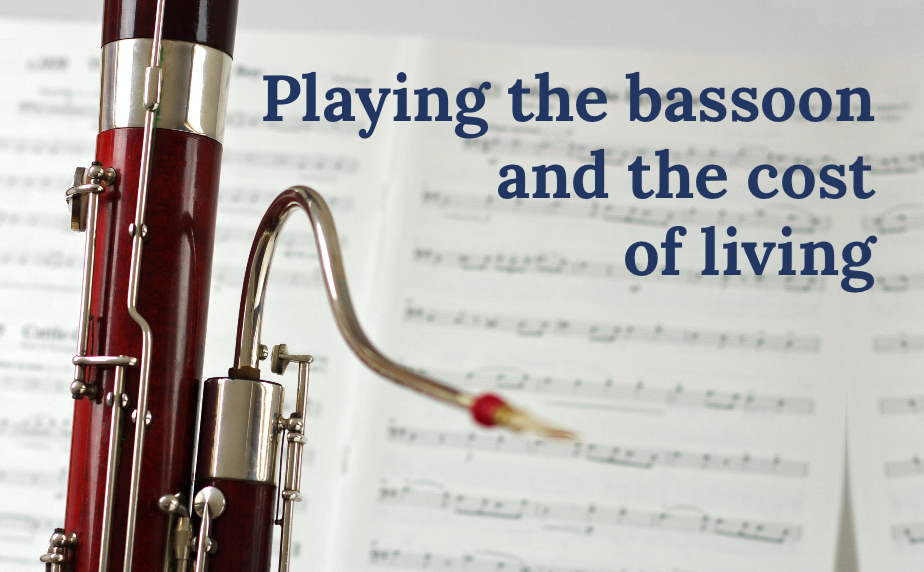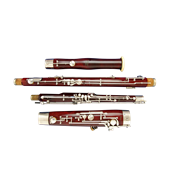Playing the bassoon and the cost of living
July 15th, 2022

Playing the bassoon and the cost of living
Playing the bassoon and the cost of living: 1
The “cost of living crisis” is a real problem for many of us in the UK and around the world. It isn’t cheap to buy or “run” a bassoon and it is likely to become more expensive in the coming months. So we thought it would be a good idea to think about how bassoonists can keep their costs down without giving up on the rewards of playing their bassoons.
We put our heads together here and have come up with a short series of articles which offer pointers on where you may be able to save money; and how, when you do need to spend money, you can minimise the outlay.
This first article looks at the regular expenditure which most bassoonists have to make. The second article will look at medium term expenditure and the third article will look at infrequent but larger expenditure.
The cost of living crisis is of course caused by prices rising rapidly when incomes are failing to follow suit. Over time, the increase in prices is likely to level off and at some point incomes for most are likely to catch up, but between now and when that happens many people will be under pressure. How much pressure and for how long depends on our individual circumstances as well as world events; some will cope relatively easily, while others will really struggle.
Shall I stop playing?
The most immediate way to save money is to stop playing your bassoon and sell it. This is the drastic option – too drastic for many of us as we will be removing one of the biggest means of fulfilment in our lives, not to mention throwing away often many years of hard work.
In a time of stress and uncertainty, as the last few years have been, it is worth reminding ourselves of the benefits we gain from playing, in terms of mental health and personal satisfaction. For many, playing the bassoon (or other instruments come to that) is the main way we have of de-stressing, and gives purpose and meaning to our lives as well as social interaction. Therefore, continuing playing can have enormous benefits and can help us navigate these difficult times successfully.
So, assuming we decide to continue playing, as the vast majority of us will, let’s look at bassoonists’ regular expenditure on bassoon-related products and services and see what can be done.
Looking after your reeds
All bassoonists require reeds. If you aren’t up to making your own you have to buy them. How many you buy and how much you spend per reed very much depends on your level of playing and how much you play. Most of our customers’ expenditure on reeds falls within the £100 to £500 per year bracket, with some spending less if they play infrequently and a very few spending more. That equates to somewhere between a new reed every two months and a reed every two weeks.
One way to save money is to buy reeds made with care and with attention to detail, as they are likely to last longer – even if they are a bit more expensive, that extra outlay may well be more than repaid.
Another way to save money is to find a reed which suits you, your crook and bassoon, and your playing style and standard, and stick to it. This may need some initial experimentation with alternatives but you can narrow down your search by talking to us; we are always ready to help you choose the best reed for you and are more than happy to spend the time discussing what you are looking for and suggesting a couple of options.
Once you have bought them, if you look after your reeds they will last longer. Here are a few tips:
- Soak a new reed in water for several minutes before playing, and allow time for it to be blown in – you may find that a reed which at first seems to be defective or unsuitable can really come into its own with a thorough soaking and given time being played.
- Keep reeds out of your reed case except when transporting them - damp reeds deteriorate much more quickly than dry reeds, and anything which restricts air movement is going to slow down the rate of drying out.
- Rotate reeds if you play every day, so that each reed dries before it is next played.
- A reed which hasn’t been played for a long period may shrink, so soak it thoroughly in water for several minutes before playing. Also do this with new reeds. It may also need adjustment (see below)
- Reeds are delicate, so handle them carefully. In particular, when putting the reed onto the crook or taking it off again don’t twist it as the blades can become misaligned. Instead, gently push the reed straight onto the crook in the correct orientation. When taking it on and off the crook don’t hold or touch the blades at all.
Before discarding reeds, consider making a few simple adjustments to give them a new lease of life. Better, check them regularly and adjust them as you go along rather than leaving them until their performance has degraded. Here are a few things to try:
- Visually check the reed for debris or damage. Remove any debris very carefully; a cotton bud may be useful to have handy. Damage to the blades is likely to make the reed beyond recovery though, so it will have to be discarded.
- Check that the blades are aligned with each other. If misaligned, the blades may be re-aligned by loosening the wires slightly, gently pushing them back into position and then tightening the wires by the same amount.
- Check the opening of the blades, and make sure you become familiar with the width of opening that you find works best for you.
- If your reed plays too freely then try closing the tip of the blades slightly. Do this by squeezing the second wire (furthest from the tip) from the sides and/or the first wire from above and below. You could also try tightening the wires slightly. And finally, try lightly scraping the sides of the reed from about a third of the way back from the tip. As this last option is not reversible it is best to attempt it only if the others don’t give you the outcome you are looking for.
- If your reed isn’t free enough then try opening up the tip of the blades slightly. Do this by undertaking the opposite procedure from above – squeeze the second wire from the top and bottom, squeeze the first wire from the sides and/or loosen the wires slightly. Again, if these don’t work, try scraping the reed at the tip very lightly and if none of this works try scraping the spines of the blades.
When adjusting reeds, it is best to make very small changes at a time, visually checking the effect and also play-testing the reed to assess the outcome. With experience you will learn how much to adjust before needing to play-test the reed.
It must be said though, that all reeds have a finite life, and using them beyond their useful life can be a false economy. Fighting defective reeds will degrade your playing ability and slow your progress as well as causing frustration, so a sensible balance needs to be struck between keeping reeds going and buying more.
When you do need to buy more reeds we offer a £2 per reed discount if you buy three reeds or six reeds, so it is best to buy three or six at a time. Also, you will save on the postage cost if you buy more reeds each time but less frequently.
It is worth making a more general point as well – when prices are rising generally, it is an almost immutable law that most things will cost more in three, or six or 12 months than they do now – so if you can afford it, in a period of rising prices it is better to buy sooner rather than later. Although we will do our very best to keep prices low for as long as possible, when our suppliers increase prices then at some point we will have to do the same.
For further information on reeds please read this article: Bassoon reeds - how to adjust them
Can I save money on bassoon lessons?
Another regular expenditure for many bassoonists is the cost of lessons. At one end of the scale there is the cost of tuition at a conservatoire and at the other subsidised group lessons at school. It isn’t possible to do much about either of those extremes, but most of us fall somewhere in between and may be able to make changes.
If you are contemplating having to give up lessons altogether it may be worth considering reducing their frequency or duration instead, as the lesser of the two evils. Some teachers are able to be more flexible than others depending on their schedules and other commitments. However, if you are an adult having lessons with a teacher oriented towards teaching adults you will often be able to have a say in how often and how long lessons are, and also what you cover in them.
If this is the case, why not give a bit of thought to whether and how you may be able to change your approach to practising in between lessons in order to make the same progress with fewer or shorter lessons? By increasing the time you spend practising and/or what you do while practising, and indeed what you cover in your lessons, you may be able to carry on making good progress while saving some money. It may need extra motivation and commitment – but if saving money during a “cost of living crisis” isn’t a motivator, then what will be?
Other playing opportunities
It would also be sensible to look at expanding your free (or nearly free) playing opportunities as well by joining or forming ensembles and orchestras locally - as playing with others nearly always improves standards. Why not get together with other bassoonists or wind players and form your own ensemble if you haven’t already done so, as well as taking advantage of established groups?
Another area of expenditure related to playing in ensembles is sheet music. One way to save money when playing in ensembles is for everyone to agree to play sheet music which is no longer in copyright. While this won’t suit everyone all the time, sheet music which is no longer subject to copyright regulations is always going to be cheaper to buy.
Second hand sheet music is also worth exploring, either from people who have music surplus to requirements or one of the many websites selling second hand sheet music.
Why not share your money-saving tips?
If you have any other money-saving tips please let us know and we can add them to the article so others can share them.
The next article in this series will look at ways to save money over a longer time period.





